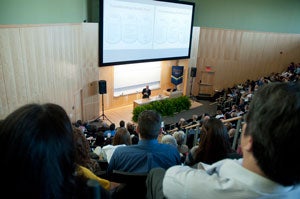URI College of Pharmacy symposium delivers compelling messages

KINGSTON, R.I. – September 17, 2012 – The United States currently spends $2.5 trillion on health care annually, the most of any country in the world, but America’s infant mortality rate is 28th in the world.
Only 30 percent of sick Americans receive same-day care, and medical errors kill as many as 98,000 Americans a year.
Those chilling facts punctuated Friday’s keynote address at the University of Rhode Island’s College of Pharmacy Symposium, “Drug Therapy in the 21st Century: Discovery and Clinical Use.”
“We also spend $4,500 per year, per individual, while Japan spends the least (about $2,000 per year per individual), and it has the highest life expectancy in the world,” said J. Lyle Bootman, senior vice president for Health Sciences and dean of the College of Pharmacy at the University of Arizona.
More than 300 students, faculty and health professionals listened to Bootman’s gripping discussion as part of a daylong, six-speaker program organized as part of this month’s opening of URI’s new, $75 million College of Pharmacy building.
“The health care business is in very serious shape,” he said as he opened his presentation, which featured funny, but telling videos about Betty and Bob Boom, aging Baby Boomers, who are taking care of a sick relative and dangerously sharing their prescription drugs. “We have some very serious challenges, but my job is to tell the truth.”
He said drug development companies have done some amazing work, and none of us could imagine a world without drugs. Ten percent of the health care dollar is spent on medications, he said, adding that effective use of prescriptions can reduce hospitalizations, improve productivity and prevent occurrence or progression of disease.
“But most of the time, you have a one in four chance of getting the right medicine for the right illness,” Bootman said.
While 85 percent of current expenditures are used to treat 15 percent of the population, and the United States is last among 19 nations in preventable deaths,  according to Bootman, there are several key steps that could be taken in the short term to save $2.5 trillion and improve the health of Americans:
according to Bootman, there are several key steps that could be taken in the short term to save $2.5 trillion and improve the health of Americans:
• Using technology, $162 billion saved
• Maintaining a healthy weight, $117 billion
• Smoking cessation, $158 billion
• Increasing adherence (compliance) with medication regimes, $177 billion
• Achieving outcomes with drug therapy, $200 billion
• Eliminating/controlling chronic disease, $1.7 trillion
Unfortunately, the health care system helps health professionals make money on disease instead of on wellness and keeping people out of the hospital, Bootman said.
“This needs to change because these values (wellness and prevention) are not maximized,” Bootman said. “Drugs are inherently value-based technology.”
He told the audience that three buckets depicted on the screen representing biomedical research, health professions education and health care delivery value are all broken.
He said it takes too long and it’s very expensive to develop new drugs, 12 years is too long to prepare a family practice doctor and health care delivery has to reach more people and be more accessible, while outcomes, such as safety, prevention and promotion have to be improved.
“It makes no sense to train nurses over here, doctors over there and pharmacists over there and then throw them all together in the real world and say to them, ‘Now get along’.”
He also pointed out that when prescriptions are written, only 50 to 70 percent make it to the pharmacy, while only 48 to 66 percent actually come out of the pharmacy, and only 25 to 30 percent are taken properly. Bootman said only 15 to 20 percent are refilled as prescribed.
He concluded his talk with a discussion of the effect of aging baby boomers’ on health care.
The total of Americans 65 years and older was about 40 million in 2010. That total will rise to 60 million in 2020 and 90 million by 2050.
“Can we afford tens of millions living to age 80 and beyond?” Bootman asked. “Can we spend more years caring for our parents than we did for our children? There won’t be enough practitioners to handle the amount of disease.”
He said the solution is empowering patients, so “they control their own information, their own genome.
“Health care must become more effective, safe, efficient, equitable, timely and patient-centered.”
URI Photo by Nora Lewis.
Media Contact: Dave Lavallee, 401-874-5862

